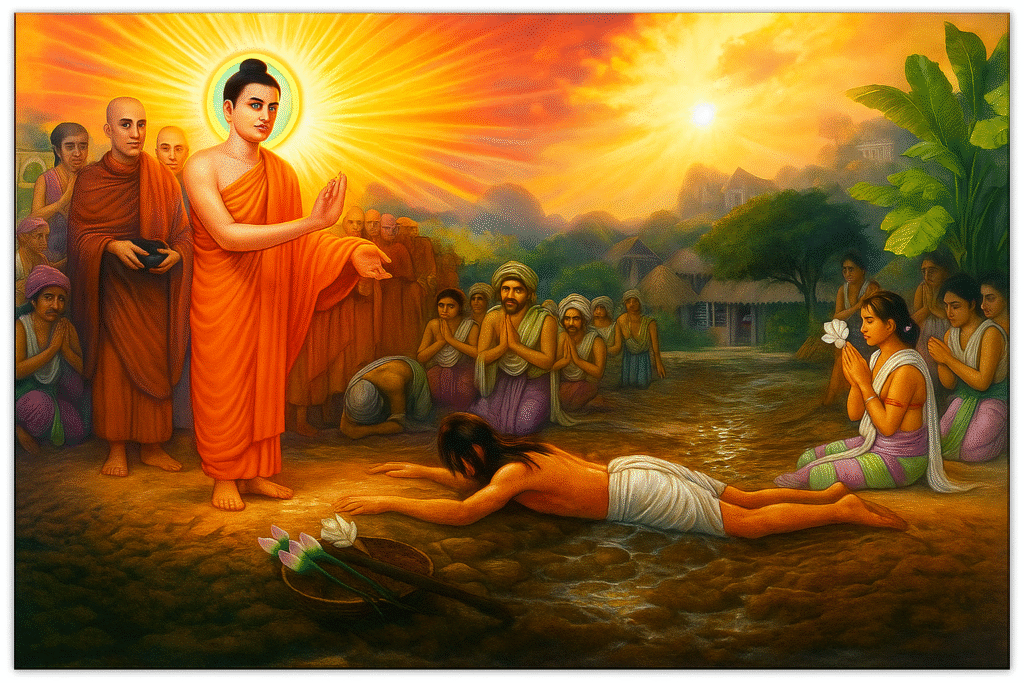In Buddhism, the concept of Suffering (Pali/Sanskrit: Dukkha) is not merely the sensation of physical or mental pain. It encompasses a much broader scope, referring to the imperfection, dissatisfaction, impermanence, and unsatisfactoriness in all aspects of life. No matter how much we try to create stability, everything changes, and this leads to Dukkha.
Dukkha is categorized into three main types:
- Dukkha-dukkha (Suffering of Suffering): These are the most obvious and easily recognizable forms of suffering, such as illness, old age, death, sorrow, anxiety, and other daily afflictions.
- Viparinama-dukkha (Suffering of Change): This type of suffering arises from the change or loss of what we love or cling to. For example, the fading of joy, separation from loved ones, loss of possessions, or the breakdown of a relationship. This shows that even pleasure can lead to suffering when it disappears.
- Sankhara-dukkha (Suffering of Conditioned Existence): This is the most subtle and profound form of suffering, arising from the inherent impermanence and lack of a fixed self in all phenomena and existence. Everything is a combination of constantly changing elements, and clinging to a “self” or a fixed reality is the cause of this suffering.
The Origin of Suffering: Craving and the Three Poisons
Buddhism clearly identifies the root cause of all suffering as Craving (tanha) – which is attachment, desire, longing, and clinging. Craving manifests in three forms:
- Kama tanha (Sensual Craving): The desire for sensory pleasures (sights, sounds, smells, tastes, touches).
- Bhava tanha (Craving for Becoming): The desire to exist, to become something, to seek fame, power, or status.
- Vibhava tanha (Craving for Non-Becoming): The desire to cease to exist, often accompanied by rejection of reality, anger, or destructive urges.
In addition to craving, the Three Poisons (Tam Độc) are the three main roots that cause all suffering and perpetuate the cycle of rebirth (samsara):
- Greed (Tham): The longing and attachment to pleasant and desirable things.
- Hatred (Sân): Anger, resentment, irritation, and aversion to unpleasant things.
- Delusion (Si): Ignorance, not understanding the impermanent, non-self nature of life and phenomena. This is the root of Greed and Hatred.
The Path to the Cessation of Suffering: Nirvana and the Eightfold Path
The ultimate goal in Buddhism is to achieve the Cessation of Suffering (Nirodha), which is the state of ending all attachment and craving – also known as Nirvana. Nirvana is not a physical place but a spiritual state:
- The complete cessation of all suffering.
- Liberation from the cycle of rebirth (samsara).
- A state of profound inner peace, free from the influence of Greed, Hatred, and Delusion.
To achieve the state of the Cessation of Suffering, Buddhism outlines a path of practice called the Eightfold Path (Magga), comprising eight correct elements:
- Right Understanding: Correct understanding of the Four Noble Truths (Suffering, Origin of Suffering, Cessation of Suffering, Path to the Cessation of Suffering), the law of karma, and the nature of phenomena.
- Right Thought: Pure thoughts, free from greed, hatred, and harmful intentions.
- Right Speech: Truthful, kind speech, refraining from lying, divisive speech, harsh speech, and idle chatter.
- Right Action: Righteous actions, refraining from killing, stealing, and sexual misconduct.
- Right Livelihood: Earning a living in a way that does not harm living beings.
- Right Effort: Continuous effort to abandon unwholesome states and cultivate wholesome states.
- Right Mindfulness: Being fully aware in all actions, words, and thoughts, clearly recognizing what is happening in the present moment.
- Right Concentration: Practicing meditation to focus the mind, develop wisdom, and achieve inner tranquility.
In summary, Buddhism does not view Suffering with pessimism but as an undeniable truth of life. By understanding Suffering, identifying its causes, and practicing the Eightfold Path, individuals can liberate their minds from all bondage and achieve true peace and happiness.


ARTICLES IN THE SAME CATEGORY
Spring Pilgrimages and Early Year Temple Visits: Preserving the Cultural Soul of Vietnam Amid Modern Spiritual Distortions
Why Donald Trump is Repealing the “Endangerment Finding”: Where Will Humanity Go if Earth Exceeds Its Limits?
Copper is emerging as a strategic metal that superpowers will compete fiercely for.
The Epstein Files and the Shadow of Power: When Dark Rumors Reflect Back Through Cinema
The More You Boast, the Cheaper Your Value Becomes
2026 Lunar New Year Holiday Schedule – Year of the Fire Horse – VietNam
ARTICLES IN THE SAME GENRE
Spring Pilgrimages and Early Year Temple Visits: Preserving the Cultural Soul of Vietnam Amid Modern Spiritual Distortions
Why Donald Trump is Repealing the “Endangerment Finding”: Where Will Humanity Go if Earth Exceeds Its Limits?
The More You Boast, the Cheaper Your Value Becomes
Seven Parts of Life Go Against Our Wishes, Clinging Only Deepens the Suffering
Live contentedly, be satisfied with what you have, and maintain an optimistic outlook on life. These are simple yet wise principles.
People constantly chase after desires, but in the end, when they achieve them and look back, they are left feeling empty.